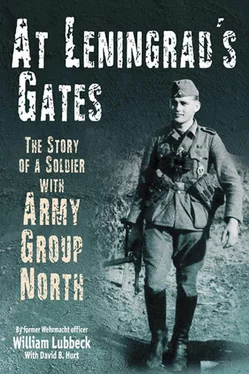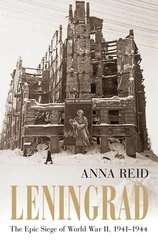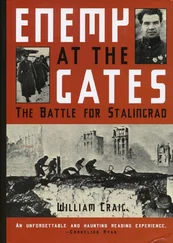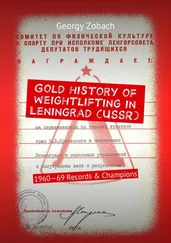About two and a half weeks after our arrival on Hela, Jüchter was outside the apartment building one afternoon when a sudden Russian artillery barrage began hammering the area. Caught in the open, he was hit in the thigh by a piece of shrapnel. Notified by a medic of his injury, I requested that our regimental physician come to examine him.
Observing the doctor as he bandaged Jüchter’s wound, I asked whether he should place a tourniquet around the sergeant’s leg as a precaution to ensure that he would not lose any more blood. The physician assured me that this measure was not necessary and that his injury was not life-threatening.
Once the bandaging had been completed, the doctor directed me to take Jüchter to a field hospital that had been established in an underground concrete bunker. Together with the medics, I assisted in carrying Jüchter the 75 yards to the facility.
Inside, wounded men were lying like cordwood along the bunker’s walls. Locating the doctor on duty, I informed him that I had a badly wounded soldier who needed urgent medical attention. He responded, “Yes, but take a look. We have to go in order of priority. Lay him down there and we will take care of him.” Leaning down to Jüchter, I assured him, “I will be back tomorrow to see how you are doing.”
On my return to the hospital bunker the following morning, I was told that Jüchter had passed away during the night. Realizing that he probably died from shock and loss of blood, it was difficult not to feel angry and bitter at the regimental doctor’s decision not to apply a tourniquet that might have saved his life. Even after experiencing the loss of so many comrades, Jüchter’s death seemed an especially needless sacrifice to me.
Now alone and possessing nothing other than my uniform and a couple of pistols, I contemplated my situation. Nothing had changed in my orders, but I finally felt a renewed sense of motivation to find a way off Hela.
Early the following evening, I wandered the 500 yards from the apartment building to the harbor area to find out what was happening. Unexpectedly, I stumbled onto a chance situation that changed the course of my life.
Observing about 400 fully equipped troops standing around near the dock, it was obvious the unit was preparing to depart Hela. In an instant, I made up my mind to tag along with them wherever they were destined. Conversing with the soldiers, I recognized their Silesian accents and learned that their infantry regiment had orders to sail for Germany.
Oddly, no one ever questioned my presence nor requested my orders either in Hela or during my journey there from the front. This may have been due to the deference given an officer, though I still only wore the lower rank of first lieutenant despite my field promotion to captain in March. Alternatively, this failure to challenge me may have simply been another reflection of the mounting chaos behind the lines.
When the order to depart came just after dark, I filed onto the deck of one of the small barges with a couple of hundred of the soldiers. A half hour later, a mile or so outside the harbor, a giant shadow loomed up in front of us. A brand new destroyer of the Kriegsmarine (German Navy) was readying to sail for Germany.
After climbing up a net hung down the side of the ship, we were warmly welcomed by the crew and directed where to go. While the enlisted personnel bedded down in the cool night air on the deck, I was escorted to one of the cabins below.
Despite the recent torpedoing of other German ships sailing west, I finally felt a flicker of optimism about my chances of survival as I lay in my bunk. What would happen now?
Early the following morning, a sailor came to my bunk and woke me. In a somber voice, he announced, “Herr Oberleutnant, der Krieg ist vorbei.” (“Lieutenant, the war is finished.”)
The date was May 9, 1945.
Looking back, my lucky escape from Hela that night probably saved me from making a choice between going into captivity in Russia or taking my own life. Yet at that moment when I learned of the surrender, my mood was neither one of joy nor sadness. Instead, I felt only numb disorientation at the loss of all that I had known, and deep uncertainty about what lay ahead for me and for Germany.
Chapter 1
A VILLAGE UPBRINGING

GERMANY IN 1937
JUST FIVE YEARS AFTER the Second World War ended for me on that destroyer, the ominous specter of a new war with Russia haunted my thoughts and dreams.
I knew what war meant. Relentless heat and dust in summer. Bone-chilling cold in winter. Bottomless mud in fall and spring. Insatiable mosquitoes and incessant lice. Sleep deprivation and physical exhaustion. Bullets whistling through the air. Shells and bombs shaking the earth. Stench from rotting corpses. Constant fear of capture or death. The agony of losing comrades. Numbing brutality. Painful separation from my loved ones.
As the tensions between the Soviet Union and the West increased during the late 1940s, war again darkened the horizon. Having barely survived my years of combat in Russia, a return to soldiering and the battlefield weighed heavily on my mind. As a still young veteran who had served as a junior officer in the Wehrmacht, it was almost certain that West Germany’s Bundeswehr would call me back to duty if another war broke out, but I wanted no part of it.
Confronted with the prospect of a new military conflict in Europe and the still grim economic conditions in post-war Germany, my wife and I debated whether to leave behind our families and Fatherland to seek a better and more secure future abroad. The decision to emigrate from Germany was one of the most difficult and momentous choices of my life. In retrospect, it was the turning point when I put Germany and war behind me to begin a new life, first in Canada and ultimately in the United States.
Yet, as I grow older, the past increasingly draws me back. They say that the older you get, the more you remember what happened long ago. Perhaps that is true. Even after more than a half-century, memories of my childhood in Germany, the years of soldiering in the Second World War, the struggle to survive in post-war Germany, and my first years as an immigrant remain vividly and indelibly etched on my mind.
My generation was brought up differently than are young Germans today. The family was at the center of German society and worked together with the schools, churches, and the government to reinforce the social order and conservative values. In Germany, families and schools taught my generation a respect for our fellow men and for authority that is absent today.
This respect for others was perhaps best manifested in the basic courtesy that we were taught. If a man was riding a full bus or train and a woman or an elderly person boarded, he gave up his seat. If a man came into a house, a church, or a school wearing a hat or cap, he removed it. When a gentleman met a lady, he lifted his hat from his head and made a slight bow to her. He always escorted a lady on his right arm and opened the door to allow her to enter first. Such practices may appear quaint today, but they were the reflection of deeper values of society in Germany at that time.
The society at large accepted and respected authority because we grew up with it, particularly in the more conservative rural areas away from the big cities. There were strict rules for social behavior and official permits for everything from marriage to a change of residence. Public protests were uncommon and were generally small affairs in comparison to the frequency and scale of those today.
When demonstrations did occur in the 1930s, they were limited to the large cities and organized by a political party like the Nazis or the Communists. Most German citizens would never have considered going into the streets to march and chant for any cause. The amount of protesting and demonstrating in modern Germany would be unimaginable to my generation.
Читать дальше













